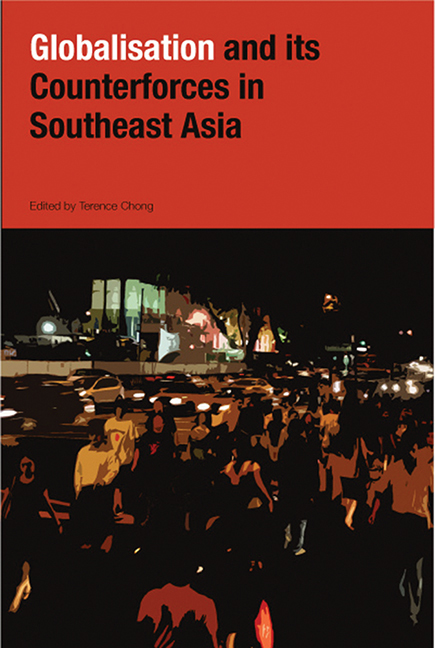Book contents
- Frontmatter
- Contents
- Foreword
- Preface
- The Contributors
- Introduction
- Part I The Political Contradictions of Globalization
- 2 Authoritarian States in Southeast Asia in Times of Globalization: Vietnam, Cambodia, Laos and Myanmar
- 3 From Plural Society to Political Pluralism in Malaysia
- 4 Indonesia's Role in the Long-term Prospects of ASEAN
- 5 Civil Society, Accountability and Governance in Thailand: A Dim Case of Participatory Democracy
- Part II Economic Regionalism and Global Influences
- Part III Local Security, Global Insecurity
- Part IV Social Processes: Arrested Development
- Part V Cultural Production in the Global Matrix
- Index
3 - From Plural Society to Political Pluralism in Malaysia
from Part I - The Political Contradictions of Globalization
Published online by Cambridge University Press: 21 October 2015
- Frontmatter
- Contents
- Foreword
- Preface
- The Contributors
- Introduction
- Part I The Political Contradictions of Globalization
- 2 Authoritarian States in Southeast Asia in Times of Globalization: Vietnam, Cambodia, Laos and Myanmar
- 3 From Plural Society to Political Pluralism in Malaysia
- 4 Indonesia's Role in the Long-term Prospects of ASEAN
- 5 Civil Society, Accountability and Governance in Thailand: A Dim Case of Participatory Democracy
- Part II Economic Regionalism and Global Influences
- Part III Local Security, Global Insecurity
- Part IV Social Processes: Arrested Development
- Part V Cultural Production in the Global Matrix
- Index
Summary
INTRODUCTION: THE MEANING OF NEW POLITICS IN MALAYSIA
Most researchers of Malaysia take off from the perspective that Malaysia is a “plural society” wherein two or more “races” live side by side in one political unit, yet do not mingle with one another. “Primordialism” which refers to strong ineffable sentiments and attachments based on blood relations, kinship, tribe, race, common language, religion, social customs, territory, etc., is a concomitant of the plural society. For Geertz, primordialism is invoked to provide meaning and solace to ordinary people when their societies are undergoing rapid social change. However, in multi-ethnic societies, primordialism also threatens to disrupt the nationbuilding process. An “integrative revolution” that ushers in “civic politics” is therefore required to arrest the break-up of these new nations. In the case of Malaysia, this integrative revolution takes the form of “consociationalism”. For Lijphart, it is usually the elites of communal-based political parties, who purportedly share universal values amidst the parochialism purportedly of the masses, who assume the responsibility for preserving political stability and achieving economic development through their moderate and altruistic inclinations. In the context of Malaysian studies, it is often argued that the Barisan Nasional (BN or National Front, previously the Alliance) ruling elites are responsible for maintaining political stability and facilitating economic development.
Contrary to these ethnic-tinged perspectives, it may be argued that there now exists a New Politics in Malaysia. A careful analysis of the 1999 general election results provides evidence of this New Politics. To elaborate on this New Politics it is necessary to distinguish between two realms of politics: formal electoral politics involving the political parties and non-formal participatory politics often involving NGOs and other local community groups who do not necessarily focus on winning elections.
THE MEANING OF NEW POLITICS
Ethnicity remains a very salient aspect of Malaysian politics. However, whereas ethnicity previously dominated the discourse and practice of Malaysian politics and posed limits on democracy, it no longer does so to the same predictable extent.
- Type
- Chapter
- Information
- Globalization and its Counter-Forces in Southeast Asia , pp. 51 - 75Publisher: ISEAS–Yusof Ishak InstitutePrint publication year: 2008

